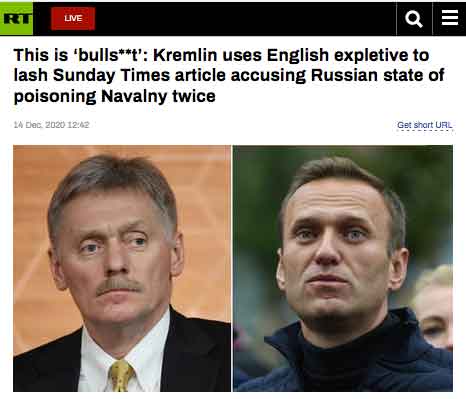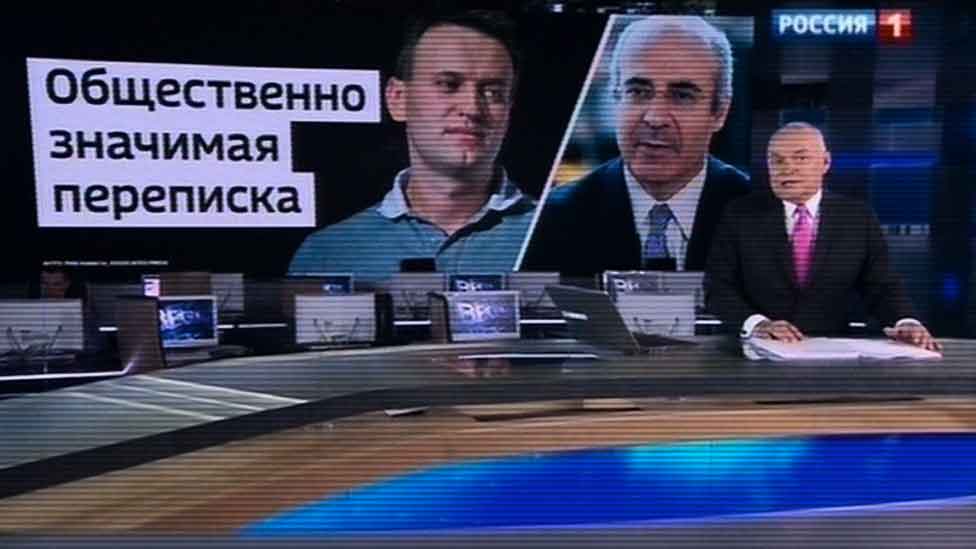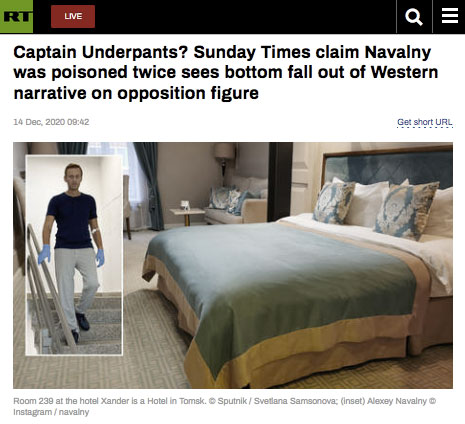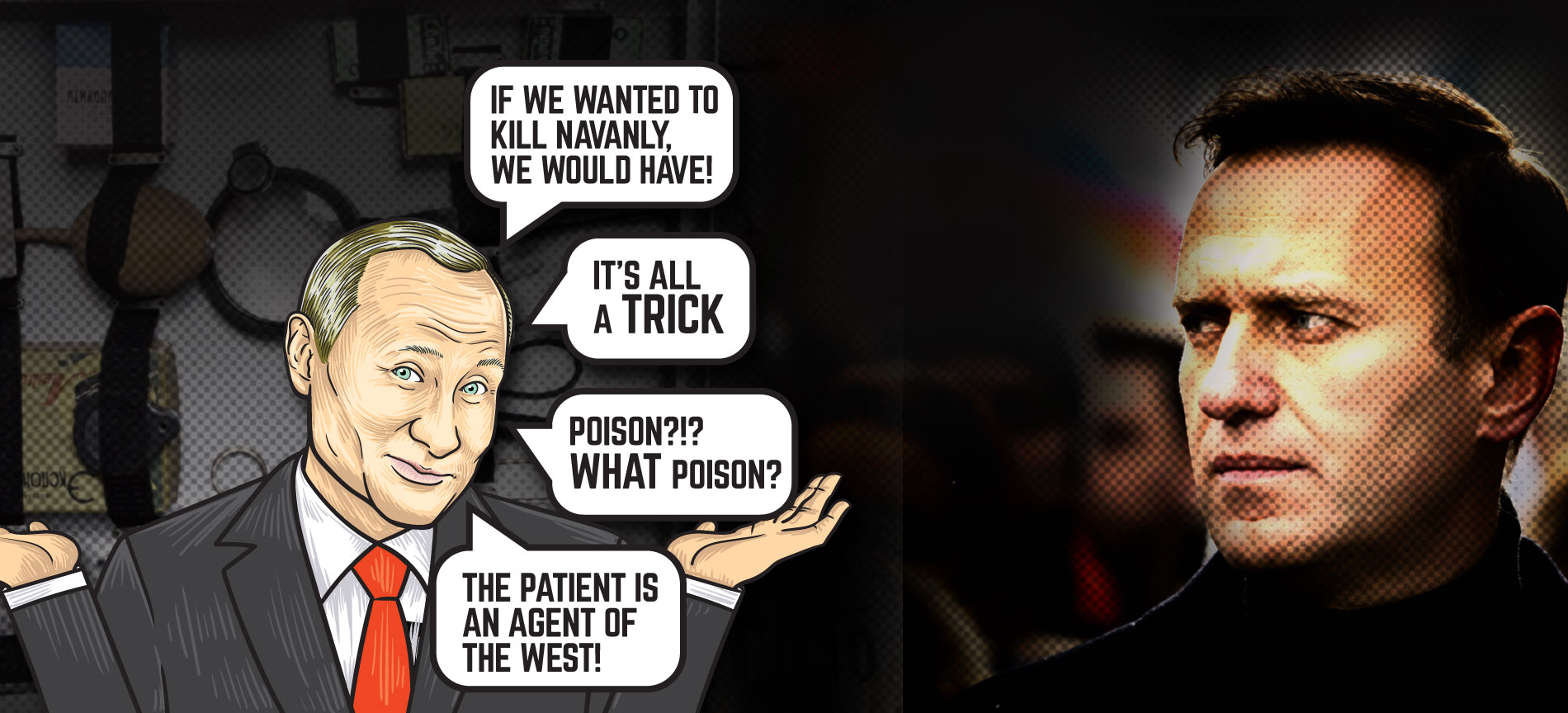Ever since Russian anti-corruption activist Alexey Navalny was poisoned on August 20th in the Siberian city of Tomsk, Russian state media and pro-Kremlin commentators have engaged in a media campaign to: deflect blame away from the Putin regime, mock Navalny, blame western states for the poisoning, and belittle anyone who suggests Russian state involvement in the poisoning.
DisinfoWatch has reviewed statements and articles published by the Russian government, Russian state media, and pro-Kremlin commentators since the August poisoning to identify and expose common narratives including those commentators in the west who promote them.
On December 14, results of a joint international media investigation into Navalny’s poisoning were published by Bellingcat in partnership with CNN, The Insider, Der Spiegel and El País, in which the members of the Russian FSB team responsible for the assassination operation were identified. Bellingcat, founded by Eliot Higgins in 2014, is an investigative journalism organization that specializes in using open-source intelligence.
Russian state media rejected the investigation, as did Russian president Vladimir Putin, who told reporters in an annual marathon press conference, that if his government wanted to kill Navalny, they would have “finished” the job. Putin and Russian media have claimed that Navalny is a western agent, and that the report was fabricated by western governments and “implanted” by them in the media.
The U.S. State Department responded, stating that “Russia’s shameless disinformation campaign, including its efforts to shift the blame for Mr. Navalny’s poisoning, will not deter us and our allies from seeking accountability for this crime”.
On December 21, Alexey Navalny published a recording and transcript of a telephone conversation he had with one of the members of the FSB assassination team, in which the agent, Konstantin Kudryavtsev, admits to having travelled to the city of Omsk to clean up any traces of the chemical nerve agent, Novichok, which was used by the FSB to poison and kill Navalny. Kudryavtsev, also admits in the video that the operation was a failure and would have succeeded in killing Navalny if the pilot of the plane carrying Navalny from Tomsk to Moscow had not redirected to Omsk, and had the first responders at the Omsk airport not acted so effectively to care for Navalny.
“I called my killer and he confessed” Alexey Navalny Video on YouTube with English language subtitles.
The investigation has caused an eruption of contradictory counter-narratives and propaganda from the Kremlin, Russian state media, foreign proxies, and pro-Kremlin commentators, intended to discredit Navalny, Bellingcat and the investigation into the poisoning.
“This is ‘bullshit’”
Shortly after the Bellingcat report was published, Kremlin spokesman Dmitry Peskov dismissed it as “fake information, and there are other stories that can be summed up with the capacious English word – ‘bullshit’. I’ll say no more.”

RT Screenshot.
A review of over 100 stories and narratives that dispute Russian government involvement in the poisoning reveals five primary themes:
- Denial of Russian government involvement in the poisoning, or denying that there was any poisoning at all
- Blaming the west for the poisoning and overreaction
- Deflection by accusing Navalny of being an agent of the west
- “Hahaganda” – mocking and belittling Navalny and Bellingcat
- Discrediting the Bellingcat investigation
Denial: Navalny wasn’t poisoned and if the Kremlin wanted to kill him, they could have.
- “Navalny May Have Poisoned Himself, Putin Reportedly Tells Macron”
- “Putin denies Russia poisoned critic Navalny: ‘We would have finished the job’”
- “If Russian security services wanted to assassinate the western-leaning protest leader, they would have “finished the job.”
- “The simple facts are that Aleksey Navalny fell sick on an internal flight in Russia on 20 August… a couple of days later he was flown to a hospital in Germany – at Putin’s urging”
- “Alexey Navalny Poisoned? Claims by German doctors that Navalny was poisoned appear greatly exaggerated”
- “Navalny was not poisoned: The hospital in Omsk said that Navalny had experienced severe hypoglycemia”
- “Politicized claims that Putin critic Navalny (with scant public support) was poisoned appear greatly exaggerated.”
- “You know, there is fake information, and there are other stories that can be summed up with the capacious English word – bulls**t. I’ll say no more.”
Denial is a primary information warfare tactic used by the Kremlin. In 2014, the Kremlin denied its initial invasion and illegal annexation of Crimea before later admitting to it. Despite overwhelming evidence of Russian involvement in the downing of a Malaysian airline flight MH17 in 2014 with a Russian BUK missile, and the Dutch government’s conclusion that Russia is legally responsible for the act of terror, Vladimir Putin continues to deny Russian involvement.
Blame The West: The Kremlin would like to investigate the poisoning but the West is blocking access to information. Maybe Navalny was poisoned in Germany or the poisoning was a western false flag operation and they were responsible?
- “Kremlin: Russia Having Trouble With Probe Into Navalny Case as Berlin Fails to Share Info.”
- “Poisoning was fabricated by West.”
- “The plotline conjured up by those western intelligence reports is that Navalny ingested the poison when he drank a cup of tea at the airport in Tomsk.”
- “Germany, Not Russia, Should Answer Questions Over Navalny Case”
- “Navalny Case Findings: Why German Ministry of Defence and Charité Don’t Provide Evidence?”
- “No Certainty Berlin Isn’t Playing Double Game in Navalny Case, Russian Foreign Ministry Says.”
- “The arrogance of the European Union towards Russia has gone too far after the bloc slapped sanctions this week on Moscow over the dubious Navalny affair.”
- “Lavrov said, in a press conference, that Moscow could not rule out the story that Navalny was poisoned with a chemical in Germany, or on the plane that took him to Berlin.”
- “The US and its imperial partners alone benefit from Navalny’s alleged poisoning.”
The Kremlin often uses the tactic of blaming “the West” in order to deflect attention and blame from its own actions. In such narratives, Russia is presented as the victim of Western and NATO “imperialism” and expansion, which in the Kremlin’s version of reality, it is reacting to.
The Kremlin recently used this tactic in the context of the militarization of space, whereby Putin has publicly called for a ban on the militarization of space while blaming NATO for putting weapons in space. In reality, NATO has not put a single weapon in space, while Russia has deployed satellite killing technology as recently as December 2020.
When presented with credible evidence of human rights abuse and corruption, as in the case of Sergei Magnitsky, who discovered a massive tax fraud in 2008 committed by Russian tax officials and was incarcerated and murdered for blowing the whistle about it, the Kremlin and foreign commentators who support the Putin regime engage in smearing the critics and activists who raise these concerns as agents of Western intelligence and even as fascists.
Navalny is an agent of the West:
- “The Navalny narrative follows the US playbook of color revolutions”
- “Putin claims opposition figure Alexey Navalny working with American intelligence”
- “Opposition figure Navalny could face investigation for calling for ‘violent overthrow’ of Putin’s government”
The Kremlin has long accused Alexey Navalny of being an agent of the West – as it has many other critics of the Putin regime. Such accusations are intended to delegitimize him in the eyes of Russians as well as the West. In 2016, Russian state media produced a propaganda documentary, in which it was claimed that “Mr. Navalny had been recruited to work for MI6 by UK hedge fund manager Bill Browder some time between 2006 and 2008.” Bill Browder, who is the leader of the global Magnitsky campaign, has been a primary target of Kremlin propaganda since 2009.

2016 Russian state media documentary where Navalny and Browder are accused of being Western spies by the Kremlin.
Mock, ridicule and belittle:
- “Well, he won’t die of course – our poisons are no good – and, after a day or two we let him go to some NATO country and they’ll say he was poisoned.”
“Captain Underpants?” - “I must admit that up until last week I had never heard of Alexei Navalny…. If they wanted Navalny dead without garnering international attention why not just shoot him, take his wallet and have the Tomsk police chief rule it as a robbery gone bad. Case closed.”
- “Magic Novichok … why was this deadly substance not deadly?”
“…claims are so outrageous that many thinking people will react with laughter, and then perhaps start questioning the poisoning story as a whole…. Navalny wasn’t poisoned by a nerve agent smeared on his water bottle, as has previously been asserted, but rather was attacked by means of his underpants” - “Kremlin accuses Alexei Navalny of ‘comparing himself to Jesus’”
In 2017, NATO’s Strategic Communications Centre of Excellence in Riga published a report on the use of humour in propaganda in which one of the authors, Solvita Denise-Liepnice, suggested using the term “Hahaganda” for disinformation narratives that ridicule their target individuals, organizations and issues.\

RT Screenshot
In an April 2019 post, the EU’s Eastern StratCom’s EUvsDisinfo wrote that “The goal of hahaganda is not to convince audiences of the truth of a particular joke, but rather to undermine the credibility and trustworthiness of a given target via constant ridicule and humiliation.”
The EUvsDisinfo post makes the following observation:
“It is ironic, then, that Russian and pro-Kremlin disinformation outlets often seek to disguise their anti-Western lies and deception behind a veil of satire, claiming it is within their rights of free speech, while aggressively refusing to tolerate any satire that is critical of the Kremlin or undermines its political agenda. An example of this hypocrisy is Russia’s ban on the 2018 British comedy The Death of Stalin.”
Attack the credibility of Bellingcat: questioning its funding, and the qualifications of its founder, Eliot Higgins and accuse it of being a tool of western intelligence agencies.
- “Bellingcat looks very much like the information warfare department of MI6”
- “Bellingcat’s investigations align with Britain’s geopolitical objectives, and appear to be overwhelmingly targeted at Russia, the idea that the outfit is colluding with Western spooks feels all the more plausible”
- “This is the blog of Elliot Higgins, a failed underwear salesman and videogame enthusiast that the Western media insists on treating seriously as an investigative journalist.”
- “The West can seemingly retire MI6, the CIA and other intelligence services, because these days all information and disinformation to substantiate accusations against Russia derives from Bellingcat.”
- “material was provided by Western intelligence services”
Bellingcat was also responsible for exposing the identities of the Russian GRU military intelligence agents behind the March 2018 Skripal poisonings in Salisbury, England. Vladimir Putin continues to deny Russian involvement despite overwhelming evidence to the contrary and has accused Bellingcat of publishing misinformation about it. The Kremlin claims that the GRU agents identified in the Bellingcat report were in Salisbury on a sightseeing tour.
White, Fluffy and Innocent
As a recent EUvsDisinfo article notes, the tactical approach taken by the Kremlin on most issues is to present itself as an innocent victim and to accuse others of seeking to undermine it through false narratives.
It has done so regularly over the past decade. The Kremlin regularly blames NATO for Russia’s foreign aggression, while at the same time militarizing the Arctic and space, and building up conventional forces in its Western Military District.
During his December 2020 marathon press conference, a clearly rattled President Vladimir Putin, told BBC reporter Steve Rosenberg, that in comparison to the West, Russia is “white and fluffy” and went on to accuse the Bellingcat investigation of being a “trick.”
The Navalny poisoning offers a remarkable case study of how the Kremlin uses disinformation to deny criminal behaviour despite overwhelming evidence of its wrongdoing. Vladimir Putin has not hesitated to use military aggression, murder and lies in order to consolidate his power and wealth. Western governments and societies must view all Russian government actions and statements through this lens.


